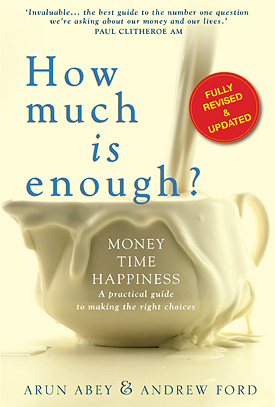
Arun Abey & Andrew Ford
(second 2008 edition after bestselling first)
See also http://www.howmuchisenough.net
Diana Giese made an invaluable contribution as editor, motivator and coach to the successful production of our new book...
Arun Abey and Andrew Ford
READ REVIEWS
|
|
|
Arun Abey and Andrew Ford, How much is enough?, extracts
‘Choice: enough is enough?
Imagine what life would be like without your favourite yoghurt; the array of restaurants just around the corner from your office; new books or a DVD on just about any topic; jeans that perfectly fit your body shape; holidays to anywhere; or simply a cup of coffee made just as you like it.
There is an extraordinary range of choices in modern life compared with
lifestyles as recent as a hundred– of even fifty– years ago. Choice, and our ability to exercise it, is an important part of our freedom and enhances our sense of being in control of our destiny.
It is, however, possible to have "too much of a good thing". When we navigate the endless rows of supermarket shelves and contend with dozens of types of breakfast cereal, styles of bread or baby food, "healthy" olive oil, soup mixes and pasta, excessive choice may well cause paralysis rather than joy. Without an advanced degree in actuarial science, anyone who has had to choose between different mobile phone plans will know the feeling of confusion and "missing out" that may result.
On average, Americans now encounter 3000 advertisements for what they can acquire every day. Given such a glut of options, how can we hope to choose wisely?
The paradox that too much choice might be a bad thing has been explored by psychologist Barry Schwartz. He has identified two key consumer types: maximisers and satisficers.
Choice is especially hard for maximisers, who always seek out the best. They spend hours, days, weeks, wading through all possible choices. When they make a selection they often descend into feelings of regret when something "better" becomes available…
Maximisers have a particularly hard time with products such as computers. They feel compelled to test everything available and take longer to make decisions. Although objectively they may end up with better results, they are usually less satisfied in the long run. "They are also less happy with life in general, less optimistic and more depressed," Schwartz tells us.
Maximisers are less able than other people to make any kind of decision at all. Drawing on research undertaken by Sheena Iyengar, Schwartz found that shoppers were ten times as likely to buy jam when only six varieties were on display as when there were twenty-four. Similarly, when the number of ways in which people could save for retirement went up, the likelihood that they would choose at all went down.
In the world of investment markets, this is a serious issue. For would-be maximisers, given that there are thousands of readily available investment options and that it is impossible to forecast which will perform best, grief is almost guaranteed.
Satisficers, by contrast, settle for "good enough". They stop searching once they have found something that serves their purpose. They suffer less long-term regret than maximisers, waste less time and go home happy.
How will you deal with the extraordinary range of available choices, which can be either a source of disappointment or a contributor to happiness? You will be happier as a satisficer rather than a maximiser. Satisficers understand what is important and do not waste time on irrelevant trifles and distractions.’
(From How to be happy)
‘Diversity: Quality and Value
Diversification is such an obvious strategy that it is remarkable how few investors follow it. It simply involves having investments across different asset classes, countries and funds.
While many people start investing in a diversified portfolio, what typically happens is that they end up concentrating on those investments that have delivered the best returns. They gradually weed out investments that have suffered a bad 6-12 months. The portfolio is left with a few investments that have delivered high returns. Such behaviour was typical during the tech-bubble period. But when the crunch came, the result was devastating. For investors who retained small holdings in the affected companies and held a range of other investments, the impact was far less.
Diversification is important because it provides access to a wide range of investment opportunities, rather than focusing on one or two. It also provides insurance against inevitable mistakes in assessing Value.
How does the principle of diversification compare with Warren Buffet’s insistence on staying within a relatively narrow circle of competence? When one has the analytical resources that Buffett or other professional fund managers have, as well as the ability to buy controlling stakes in companies and change their management when necessary, then more concentrated portfolios can pay off. However, this is the exception rather than the norm.
Buffett’s approach to the topic is typically pragmatic. James O’Loughlin observes: "When Buffett can effectively 'eliminate' risk through objective and exhaustive analysis of the price/value equation, then he selects only a few investments. Where the quantification of risk is necessarily subjective, he diversifies."
For those keen to be actively involved in the share market with at least part of their portfolio, an effective approach may be to invest core wealth in a widely diversified, professionally managed portfolio. With the remainder of your wealth, define a narrow circle of competence based on your expertise, and invest in a concentrated portfolio of shares that fall into this circle and meet the criteria for Quality and Value.’
(From The Bridge of Wellbeing)
|